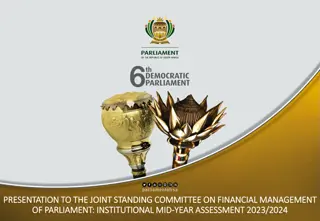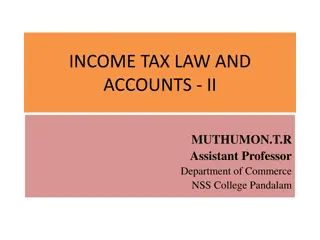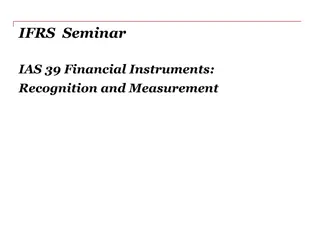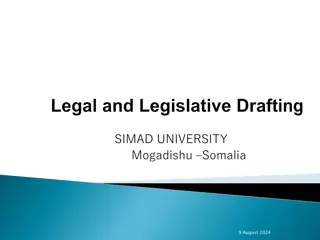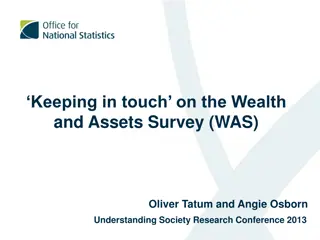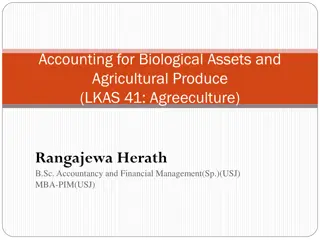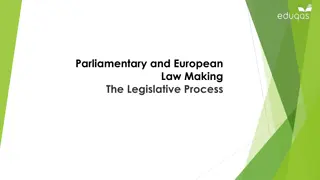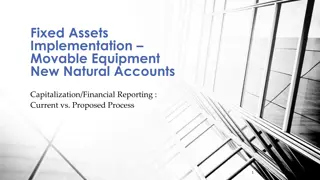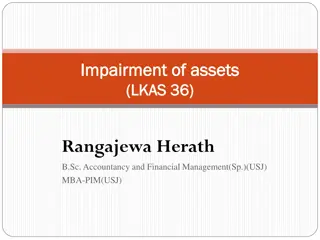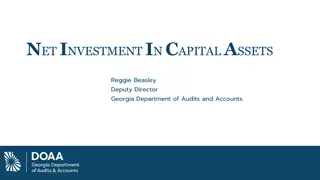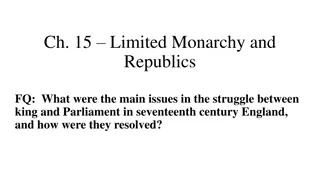Parliament's Role in Legislating for Strategic and Sensitive Assets
Focus on the legislative aspect of managing risks to national security while promoting direct investments in strategic assets. Historical background, policy changes, and the role of parliaments in addressing potential security risks are discussed. The presentation by Mrs. Eva Jhala highlights the importance of balancing national security with economic opportunities.
Download Presentation

Please find below an Image/Link to download the presentation.
The content on the website is provided AS IS for your information and personal use only. It may not be sold, licensed, or shared on other websites without obtaining consent from the author.If you encounter any issues during the download, it is possible that the publisher has removed the file from their server.
You are allowed to download the files provided on this website for personal or commercial use, subject to the condition that they are used lawfully. All files are the property of their respective owners.
The content on the website is provided AS IS for your information and personal use only. It may not be sold, licensed, or shared on other websites without obtaining consent from the author.
E N D
Presentation Transcript
PARLIAMENTS ROLE IN LEGISLATING FOR STRATEGIC AND SENSITIVE ASSETS TAKING INTO ACCOUNT THE SECURITY OF THE NATION, WHILST ENCOURAGING DIRECT INVESTMENTS Presentation Presentation by Mrs Eva Mrs Eva Jhala Legislative Consultant Legislative Consultant by Jhala
OUTLINE OF PRESENTATION Our discussions today will focus on the following: Brief Historical Background Africa How Far - Investment Policies Addressing Risks to Essential Security Interests Changing Policies Relating to Investments in National Strategic and Sensitive Assets Addressing Potential National Security Risks Addressing Investments in the Face of Potential National Security Risks Context of Transformational Reforms Parliament's Role in Legislating for Strategic and Sensitive Assets SADC-PFs Facilitatory Role A Model Law The intention of the following narrative is not to extensively discuss the issues but to give pointers to, and make a synopsis of, areas for consideration, concern, challenge and possible solution. 1. 2. 3. 4. 5. 6. 7. 8.
HISTORICAL BACKGROUND Over the past decades, many countries have eliminated most barriers to trans-border capital flows and have abolished exceptions to national treatment for the acquisition, ownership, control or operation of national strategic or sensitive assets by foreigners. This openness has created economic opportunities for home and host economies and for multi lateral enterprises to roost. With these opportunities came risks, including those related to the recipient country s essential security interests.
HISTORICAL BACKGROUND International investment instruments and a number of investment treaties or investment chapters in preferential trade agreements explicitly recognise the State Parties rights to manage such risks. Worldwide and for decades countries have had arrangements to review, assess, and address potential national security risks arising from specific foreign direct investments. However, as international investment largely took place among allies and the ratio of FDI to GDP was much lower than it is today only 7% in 1990 against around 40% currently, the amount of FDI covered by such mechanisms was relatively low. Today, parameters are different: the proportion of world FDI to world GDP has increased six-fold.
HISTORICAL BACKGROUND Advanced and most transition economies opened up to foreign capital, and the privatisation of infrastructure assets carried out during the 1980s and 1990s created a lot of potential for foreign investment. By the mid-2000s, most growing concerns about owners of certain assets or industries, as they feared that malicious owners could sabotage or withhold access to critical infrastructure . The following were some of the concerns: countries began having
HISTORICAL BACKGROUND Concerns relating to technological changes and the growing sensitivity and quantity of sensitive data; Concerns of the more assertive stance of some countries in the global economy and strategic competition; and Concerns about natural resources sustainability and generation equity. Soon after 2015, interest on the inter-section of foreign investment and essential security interests began to rise. More countries began to complement, expand, or replace, traditional authorisation considered sensitive, with new and more comprehensive policies that addressed the security risks associated with inward investment. requirements in sectors
HISTORICAL BACKGROUND In the face of security concerns, uncertainty and accelerating risk to their economies and Nation at large, countries began crafting well targeted policy responses safeguarding essential security interest. In 2009, countries that had participated in the Organisation for Economic Cooperation and Development (OECD)-hosted dialogue on international investment Guidelines for recipient country investment policies relating to national security. The adoption of these guidelines was preceded by intensive policy dialogue and analysis, which summarised what the policy community at the time considered good policy in the area of investment and security. The Guidelines have since served as a benchmark for policy design for the 39 governments that have formally adhered to the instrument, as well as many other non-adherents. as being paramount to policies adopted the OECD
HISTORICAL BACKGROUND Its therefore not surprising that over the past decade or so most European countries, Canada and the Americas and some Asian countries have enacted stringent laws on their national strategic and sensitive assets, focusing on - acquisition-ownership restrictions; Foreign-control of enterprises limitations; Land ownership limitations; and Location of infrastructure restrictions.
AFRICA HOW FAR - INVESTMENT POLICIES ADDRESSING RISKS TO ESSENTIAL SECURITY INTERESTS
AFRICA HOW FAR - INVESTMENT POLICIES ADDRESSING RISKS TO ESSENTIAL SECURITY INTERESTS Most countries in Africa have not comprehensively come up with policies or enacted laws to ensure sustainability of investments coming into their countries, especially those impacting or involving their infrastructure or advanced technology. Most have opted for piece meal enactments, say in defence and security laws, land laws, company laws, financial management laws, securities law, etc.; The pre-occupation for Africa was or is still to ensure big direct investments from foreign countries guaranteeing and protecting such investments, and assuring, without tight controls, externalization of foreign exchange earned; save those involving corruption, money laundering and terrorism financing, etc. natural resources, sensitive into their countries
AFRICA HOW FAR - INVESTMENT POLICIES ADDRESSING RISKS TO ESSENTIAL SECURITIESS INTERESTS The focus was or is still on providing more and more incentives to encourage foreign direct incentives. The actual risks involved in this investment policy area, especially relating to ownership- acquisitions/control, by foreigners, were and are pushed aside and not seriously taken into account in investment policy development or direction. In fact, land and other natural resources and advanced technologies despite wide reforms in some African countries, still permit foreigners to own and develop these under lucrative commercial transactions and undertakings, as long as they are investors, investing as little as 500,000 dollars, whilst making huge profits which are externalized. policies and laws,
CHANGING POLICIES RELATING TO INVESTMENTS IN NATIONAL STRATEGIC AND SENSITIVE ASSETS
CHANGING POLICIES RELATING TO INVESTMENTS IN NATIONAL STRATEGIC AND SENSITIVE ASSETS The policy area for investments in natural resources, advanced technology and pharmaceuticals, etc. is fast changing all over the world, with more restrictions, access and limitations being imposed. And compliance being strictly monitored Despite rapid global changes measures, Africa lags behind, except for a few countries, in legislating stringent legal rules controlling investments in certain national strategic and sensitive assets and advanced technologies by foreigners, without much consideration to security concerns. This profound investment policy area, centres on 3 elements linked for effective governance and control: encouraging direct investment; protecting and realising the value of a country s national strategic and sensitive assets; and safeguarding essential security interests systemic to the economy and the Nation. and enhanced protectionist
CHANGING POLICIES RELATING TO INVESTMENTS IN NATIONAL STRATEGIC AND SENSITIVE ASSETS Advanced and transitional economies have put in place arrangements to assess and address potential security risks arising from specific foreign direct investments. Yes, invisible policy arrangements have been used historical to manage risk but these were limiting, for example, authorisation requirements, procurement procedures, sectors of the economy reserved for domestic or majority-domestic owners, and other similar arrangements limiting investments in a few specified areas for empowerment of citizens which are not accessible to foreigners, and extending incentives to local and citizen investors. But how, and to what arrangements protected essential security interests or even grown the capacity of local investment or citizen owned big enterprises, say in the mining area, despite the vast natural resources existing in mother Africa s soils? licensing procedures, extent, have these policy
CHANGING POLICIES RELATING TO INVESTMENTS IN NATIONAL STRATEGIC AND SENSITIVE ASSETS Most countries views as to what constitutes national strategic and sensitive assets are now converging. National strategic and sensitive assets may include the following: Minerals, Land, Forests, Resources or Extractive Industries -Strategic Assets) Water Supply, Treatment Telecommunications and Sensitive Assets); Energy, Gas and Oil and related Infrastructure (Extractive Resources- Strategic Assets); Advanced Technology- know-how, data and software, algorithms, pharmaceuticals, biotechnology, etc. (Science and Technology- Sensitive Assets); and Any other asset considered to be core to the economy and impacts on its or national security, e.g., defence and government infrastructure and food security inputs and structures Wildlife and Water (Natural and Distribution Infrastructure Plants, Energy (Services-
CHANGING POLICIES RELATING TO INVESTMENTS IN NATIONAL STRATEGIC AND SENSITIVE ASSETS So what should be the scope of the policy and laws in this investment area? The policy and law generally should cover regulation of foreign direct strategic assets; ownership and control, of national strategic assets so as to safeguard essential security interests; procedures relating to State acquisitions of national strategic and sensitive assets, qualifying enterprises and acquired enterprises; exempted national strategic and sensitive assets and entities; and entities eligible to be governed under nationality-neutral measures. investments in national
CHANGING POLICIES RELATING TO INVESTMENTS IN NATIONAL STRATEGIC AND SENSITIVE ASSETS The law should specifically cover regulatory functions or powers relating to the use of natural resources or advanced technologies, except to the extent prescribed; regulatory authorities established under any other law or portfolio Ministries, except to the extent prescribed; licensing procedures which regulate the use rather than the ownership of a national strategic or sensitive asset or enterprise; concessions and use rights where the Government holds monopolies; sale of strategic assets in which the Government is the seller, and risk can be managed by the choice of the acquirer; acquisitions of strategic assets in which the Government is the acquirer, under public procurement Partnerships or joint ventures where the Government is able to manage the risk through choice of its suppliers or Partners; State ownership or control transactions, whether constituted or commercial, including control ensured through special or golden shares, where the State is able to control decisions and risks as if it was a private entity; or any obligation arising under any treaty. processes, Public-Private
ADDRESSING POTENTIAL NATIONAL SECURITY RISKS
ADDRESSING INVESTMENTS IN THE FACE OF POTENTIAL NATIONAL SECURITY RISKS However, addressing, directly, national security has become essential and the designs to manage these have become more complex and embedded in legislation, either as stand alone laws or integrated in complex competition (anti-trust) laws using public interest tests related to essential security interests. As Members of Parliament your role is to understand and interrogate these complex arrangements/mechanisms presented in draft legislation or you should encourage debate on these matters. Your role is: to recognise public interest concerns relative to these issues, as to who controls your economies, if its dominantly foreign controlled, identify what are the risks to essential security interests?; where the risk is associated with the acquisition or ownership of national strategic or sensitive assets, what measures should Parliament legislate to safeguard essential security interests?; and if there is dire need for direct foreign nationality neutral measures or exemptions will be embedded in legislation to encourage this? investment policies related to structural and normative investment, what
ADDRESSING INVESTMENTS IN THE FACE OF POTENTIAL NATIONAL SECURITY RISKS Despite adaptable policies and continual reform, implementation of acquisition and ownership related policies has brought to light some practical challenges. Even flexible instruments may not necessarily lead to desirable outcomes in all cases. Those countries that have advanced mechanisms to manage acquisitions and ownership/control related risks have taken different approaches, chosen different criteria to identify risk, formulated policy and procedures with different level of detail, and have allocated vastly different institutional and financial resources to the implementation of their mechanisms. However, even recent reforms or features of recently introduced mechanisms have not levelled these differences or brought about a degree of convergence in approaches relating to management of risks, despite agreed upon principles, peer-learning processes and procedures, and available comparative information on policies and studies suggesting best practices.
ADDRESSING INVESTMENTS IN THE FACE OF POTENTIAL NATIONAL SECURITY RISKS Despite this diversity, four trends emerge which are essential in addressing investment in the face of potential national security risks. There is need for: strong and well integrated/coordinated institutional structures to manage and regulate this policy area; review mechanisms embedded in law geared towards routine implementation, with roles and responsibilities and procedures clearly set out ; continuous risk-management, complementing one-time reviews at the time of an acquisition; State-ownership as a means to manage risk which is attracting renewed interest after having broadly fallen out of fashion in the 1990s.
ADDRESSING INVESTMENTS IN THE FACE OF POTENTIAL NATIONAL SECURITY RISKS While earlier policies had reflected concerns for essential security risks associated mainly with defence production, and later with critical infrastructure, many countries are including advanced technology and personal data in the scope of sensitive assets. As transmission channels through which threats are thought to materialise have become more diverse, new transaction types are now being brought under the umbrella of acquisitions and ownership-related policies to manage essential security risk. As part of a broader awareness and understanding of risks and types of exposure, some countries are recognising that non- ownership transactions may create exposure similar to that generated by ownership relations; leases, procurement, use of certain equipment in critical infrastructure, and international research cooperation, are among some of these non-ownership transactions economic interaction. Therefore, acquisitions or ownership increasingly appear as only a partial solution to a broader challenge. While the understanding of these issues is growing, the need for and design of adequate policy responses needs to be explored further. focused policies may
ADDRESSING INVESTMENTS IN THE FACE OF POTENTIAL NATIONAL SECURITY RISKS A precautionary warning to you as Hon MPs when scrutinising laws on investments whist considering national security risks is the following: the design of adequate measures for effective policy responses needs to be explored further if a transformational framework for regulating and managing national strategic and sensitive assets is to be successful; the proliferation of acquisition-and-ownership-related mechanisms, their evolving designs, and measures, are likely to increase mechanisms and measures, rules and obligations under domestic and international law; the proposed interactions may influence and occasionally constrain the design and implementation of current policies and strategies. Therefore, acquisition-triggered review mechanisms, commonly identified as investment policies related to national security , must be seriously considered and clearly legislated for; more assertive interaction implementation between these
ADDRESSING INVESTMENTS IN THE FACE OF POTENTIAL NATIONAL SECURITY RISKS these requirements for certain acquisitions or greenfield projects, licensing requirements that are inaccessible to foreign- controlled entities, and other arrangements that relate to ownership or forms of control that are not conveyed by ownership; whatever the system chosen, the correlation with other related laws must be maintained. Therefore, it is imperative that the governing system used to effectively manage and regulate national strategic and sensitive assets must be such as will enable effective policy responses; it must also promote greater transparency, accountability and trust, and allow the private sector to do business in a well organised and regulated business environment, whilst ensuring liberty to contract and settle business disputes independently without much intervention or interference by governments. may encompass notification and authorisation
ADDRESSING INVESTMENTS IN THE FACE OF POTENTIAL NATIONAL SECURITY RISKS To ensure such responses it is important to put in place effective communication, coordination and consultation mechanisms with Ministries and regulatory mandated to manage and/or regulate the sectors in which the targeted national strategic and sensitive assets are currently under. Effective policy responses will enable oversight bodies to monitor and evaluate risks, challenges and successes of the system. existing authorities portfolio legally
CONTEXT OF TRANSFORMATIONAL REFORMS The regulation and management of, and investment in, national strategic and sensitive assets, institutional and legislative transformational reforms, cannot take place in a vacuum, but must be relative to existing institutional and legislative frameworks. It is, therefore, imperative that the reforms to be undertaken, take into account and be considered in the context of some of the following factors and considerations: economic developments; wider national economic priorities and plans for national development, as well as priorities across different geographic areas; current laws that have an impact, both positive and negative, on such strategic assets and current institutional mandates; the population of member states and their human resources; sector policies and plans for development of natural resources, energy, telecommunications, and advanced technology; businesses and attendant
CONTEXT OF TRANSFORMATIONAL REFORMS Governments obligations at regional and international levels, under a range of treaties and declarations, such as the UN Sustainable Development Goals (SDGs), Multi-lateral and Agreements, and those for regional integration and trade facilitation under the African Union, COMESA and SADC, etc; existing loans and other contractual agreements entered into by existing targeted businesses, including lenders rights; Public companies securities compliance; competition, fair trading and consumer protection requirements; commitments, targets and Bi-lateral Investment
CONTEXT OF TRANSFORMATIONAL REFORMS public procurement systems; mergers and acquisitions; taxation, export and import restrictions, especially under control of goods legislation; risk management; environmental requirements; dispute resolution mechanisms; divestment of certain State Assets under strict control mechanisms; the capacity of the public service to deliver and effectively implement transformational reforms; and sustained political good will.
PARLIAMENT'S ROLE IN LEGISLATING FOR STRATEGIC AND SENSITIVE ASSETS
PARLIAMENT'S ROLE IN LEGISLATING FOR STRATEGIC AND SENSITIVE ASSETS Parliaments have a crucial role in enacting laws to protect strategic and sensitive assets, and ensuring national security, as these assets are critical to a country's national security and economy. These laws must balance investments in the economy while preventing foreign entities from gaining undue control over critical assets. Parliament's actions must ensure the protection of national security whilst promoting economic growth in a transparent and accountable manner. These assets are crucial in ensuring the smooth functioning of the country's infrastructure and essential services, such as minerals, sanitation and treatment, military installations, energy facilities, forestry infrastructure. Protecting these assets is essential for safeguarding the public interest. the need for direct water, water supply, and telecommunication
PARLIAMENT'S ROLE IN LEGISLATING FOR STRATEGIC AND SENSITIVE ASSETS Protecting National Security whilst encouraging Direct Investments is a complex endeavour but one cannot over emphasise the role of Parliaments in achieving both. The following is a check list of critical issues: the need to ensure the enactment of laws to protect strategic and sensitive assets, following global best practices whilst balancing investments into the economy; recognising and understanding that the protection of strategic and sensitive assets is vital for safeguarding national security and the economy, and striking a balance between the two; understanding the consequences of failing to protect strategic and sensitive assets can be severe, with significant risks to national security and the economy; the need for direct
PARLIAMENT'S ROLE IN LEGISLATING FOR STRATEGIC AND SENSITIVE ASSETS recognising that, if foreign entities gain undue control over strategic and sensitive assets, they may have the power to manipulate or disrupt vital infrastructure, leading to economic and social threats and instability of the Nation; failing to protect strategic and sensitive assets can expose these assets to hostile entities seeking to harm the country's interests; balancing national security and economic growth is a delicate process that requires a well-considered approach and methodology; and the laws and regulations enacted to protect strategic and sensitive assets must transparent and comprehensive;. be effective, efficient,
SADC-PFS FACILITATORY ROLE A MODEL LAW SADC-PF has become an anchor to Member States in its role of facilitating the enactment of national laws dealing with complex contemporary matters. The Model Laws issued by SADC-PF encompass standards, and ease the challenges and incapacities faced by Member States in drafting suitable laws to modernise their Statute Books. A Model Law can bridge gaps in existing legislation by providing comprehensive guidelines for the protection of strategic and sensitive assets, ensuring that foreign entities do not gain undue control over these assets and Member States provide adequate measures and mechanisms to protect this from happening. The Model Law can expedite enactments across the SADC Region, creating a level playing field and ensuring that all countries have similar laws. best practice global
THE END THANK YOU FOR YOUR ATTENTION Q $ A


